Papua New Guinea (PNG) is digging out from riots that erupted on January 10 and rapidly turned Port Moresby into a “war zone.” Crowds took advantage of police striking over tax increases, and looted and burned shops and businesses in a spree of damage estimated at 1 billion kina ($300 million). 22 people were killed in the capital as well as the city of Lae.
Over a week later, Port Moresby has reverted back to its usual bustle, though the police presence remains high. The reckoning continues, with investigations underway into the conduct of senior police officers and relief efforts being devised to aid business owners, employees, and producers whose property and livelihoods were torched in the melee.
Many speculated that Prime Minister James Marape’s leadership would topple as the riots exposed deeply entrenched inequities and dysfunctions his government has not adequately addressed. The gap between the promise and delivery of economic betterment and opportunity is a political problem Marape, like almost every current government, faces and must work to address. The riots certainly revealed a potent mix of economic desperation and opportunism.
Marape’s political success, despite these challenges, has been due to his championing of a unifying cause that has has deep reverberations in PNG and in recent months, on the world stage. Marape has been rallying his nation around Christianity, namely a brand of evangelicalism that is on the verge of a whole new level of influence. The political pressure stemming from the riots will likely mean even more emphasis on the Christian faith, particularly as PNG is likely to declare itself a “Christian nation” in early 2024.
Continue Reading on The Diplomat
This preview shows approximately 15% of the article. Read the full story on the publisher's website to support quality journalism.
